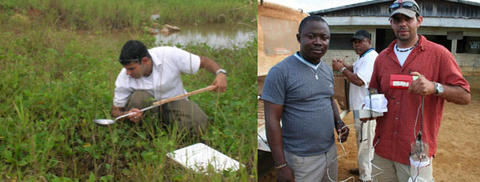
While a Graduate student at Yale, Mike Reddy’s main research interests include malaria and arthropode-borne disease ecology; mosquito vector population dynamics; and anti-vector intervention design and implementation. Mike was involved in a multi-agency collaborative effort with officials from the Equatorial Guinea Ministry of Health, the Marathon Oil Corporation and Medical Care Development International. His research projects addressed two issues of paramount importance to the sustainability of ongoing and anticipated anti-vector intervention activities on Bioko Island and mainland regions of Equatorial Guinea, Central Africa. 1) To elucidate how the ecology, population structure, host-seeking and resting behaviors of Anopeheles melas, a potentially important malaria vector may determine its susceptibility to mosquito suppression activities in Equatorial Guinea. 2) To describe the spatio-temporal distribution of insecticide resistance alleles among An. gambiae mosquito vectors in order to develop mathematical models for predicting the efficacy of insecticide-based interventions against these vectors. Such models will provide useful guidelines for the rational selection and use of pyrethroid and carbamate insecticides for the suppression of vector populations. The inferences drawn from the research activities served to inform intervention activities aimed at diminishing the force of malaria transmission in Equatorial Guinea and beyond.
Dr. Michael Reddy is now a Program Officer, with the Malaria Program Strategy Team-Prevent Transmission Initiative at The Bill and Melinda Gates Foundation